Hello LSC.
It’s that time of year again when we like to take a moment to present you a recap of the work performed by the LSCA for Lake St. Catherine on behalf of the lake community and our membership. What you’ll read below are short summaries of the projects and activities, but we encourage you to visit our website and click on our Blog to read the detailed accounts of all these initiatives.
It was another busy year from start to finish!
We’ll do our best to recount the year chronologically - so grab a cup of hot chocolate and read on for our 2022 Year In Review.

Membership
First, a sincere THANK YOU to everyone who contributed to the LSCA this year! Our membership continues to grow - which means that there are funds available to help support our lake programs that everyone who enjoys Lake St. Catherine benefits from. Also, it shows that we have a great community of lake stewards who are invested in the preservation, protection, and maintenance of Lake St. Catherine.
At the end of 2021, we set an ambitious goal of reaching 400 members... and we came SO CLOSE.
As of this writing, we have 388 members who contributed a total of $79,581, giving us an average contribution of $208. While we did come up just a bit short of our goal of 400 members, we did surpass our 2021 totals for both total members, and dollars contributed - and we continue to build on these numbers year over year.
Can we crack the 400 member mark next year? This will be our goal as we continue to reach out to LSC property owners, and hope to expand our reach with membership levels for family members of property owners, renters, and those who use the lake for recreation.
We hope to earn your support in 2023 as we launch our Membership Drive in early February of 2023.
Thank you for your support!
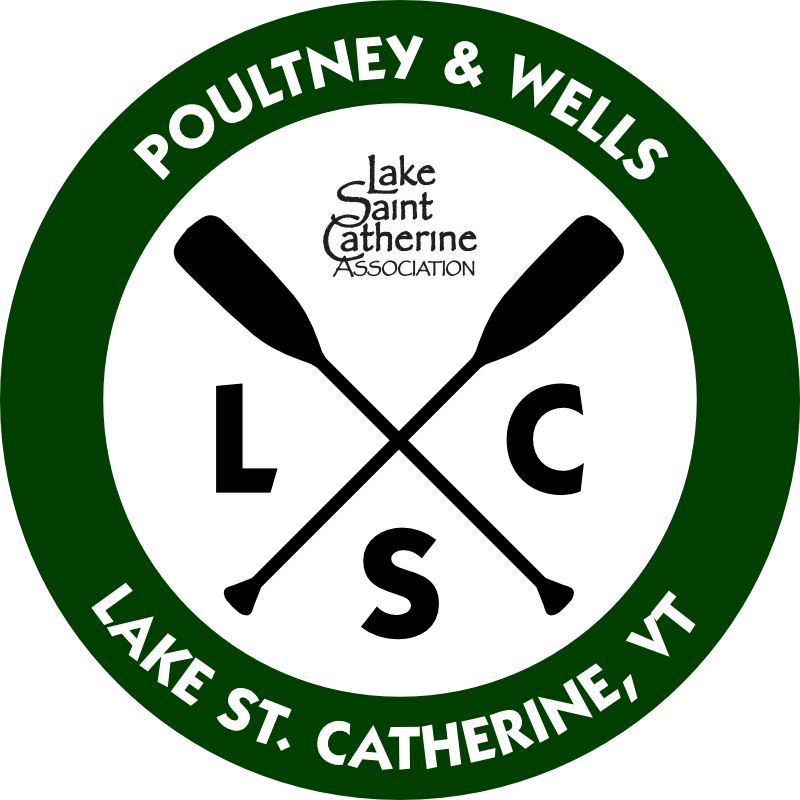
Volunteering Around LSC: Green Up Vermont Day, Milfoil Cleanup Community Day
We’d like to thank all of the volunteers that participated in the various lake related activities this season! Here is a quick summary of a few of the volunteer opportunities around Lake St. Catherine this year.
Green Up Vermont Day: Green Up Vermont Day is a state-wide volunteer cleanup day of Vermont's roads and waterways which takes place on the first Saturday in May. As Green Up Vermont's website says: "We know it isn’t your litter but Vermont needs our help to be beautiful!". Building on the success of our 2021 effort, we were able to organize volunteers to cover all the roads around Lake St. Catherine! On the morning of Green Up Day, volunteers met at the Wells Lakeside Park to kickoff the day with coffee and muffins from the Wells Country Store, thanks to the Town of Wells. Volunteers picked up Green Up Day trash bags, fueled up, and headed out to get to work. By the end of the day, the roads around the lake were cleaned up, and lined with filled Green Up Vermont trash bags. Thank you to the town crews from Wells and Poultney for picking up the bags. We’ll do it again in May!
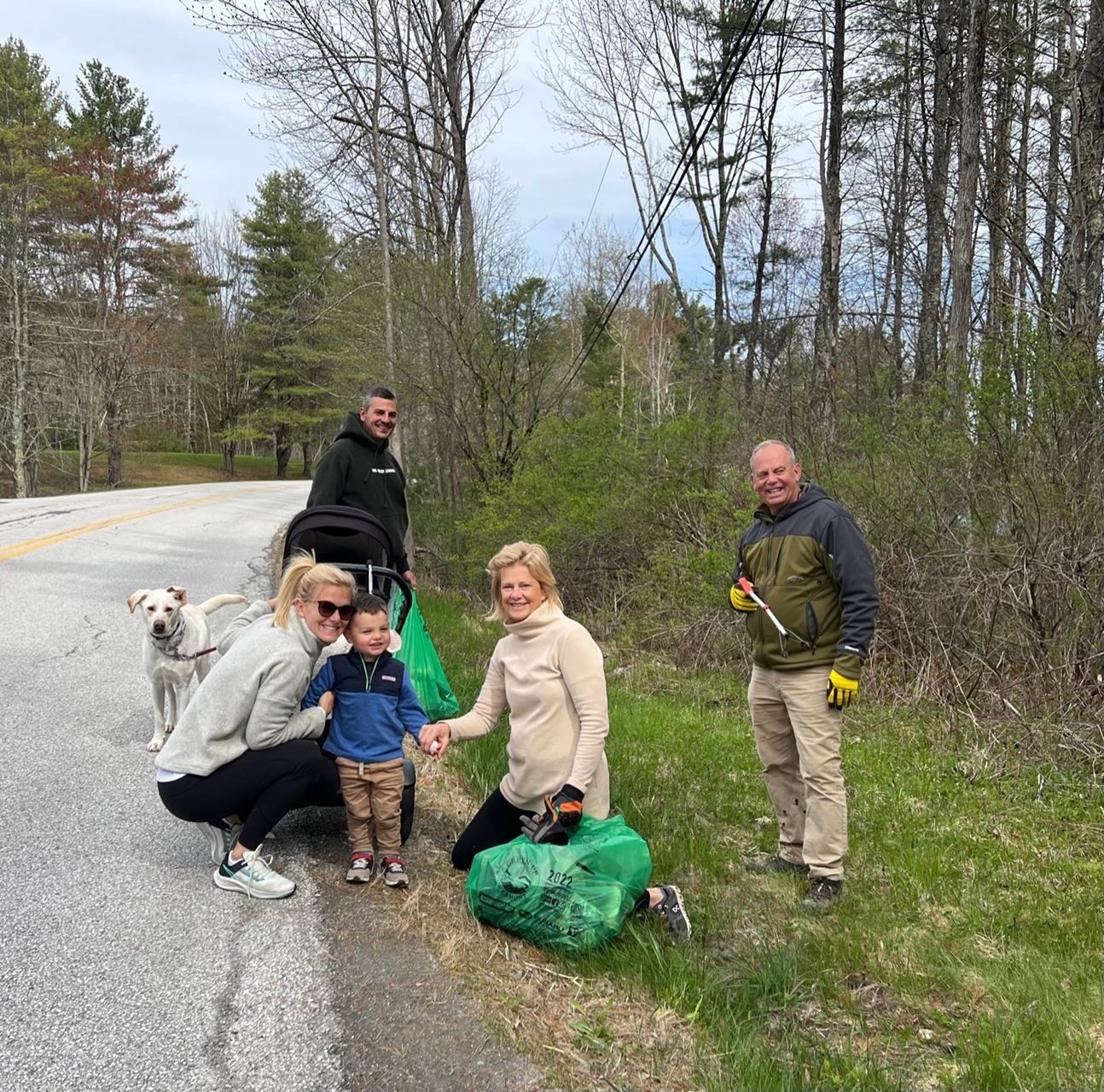
Milfoil Cleanup Community Day: In early June, as part of our milfoil control efforts, the LSCA hosted a meeting at theWells Lakeside Park on Little Lake. We discussed what Eurasian Watermilfoil (milfoil) is, what it does when introduced into a lake, and why we work to control it in Lake St. Catherine. We then outlined the milfoil control plans for the year, and we talked about what you can do to help to Stop The Spread of Milfoil in Lake St. Catherine. Then, volunteers headed out onto the lake in kayaks, boats, canoes, and SUPs to scoop up floating milfoil and other detached plants and place them on the drop off float that was set up in the Channel south of the bridge. Throughout the rest of the season, volunteers placed detached milfoil and other plants on the float, and we made numerous collection runs to remove the plants.Thank you to all the volunteers involved in this project! We’ll do it all again next year.
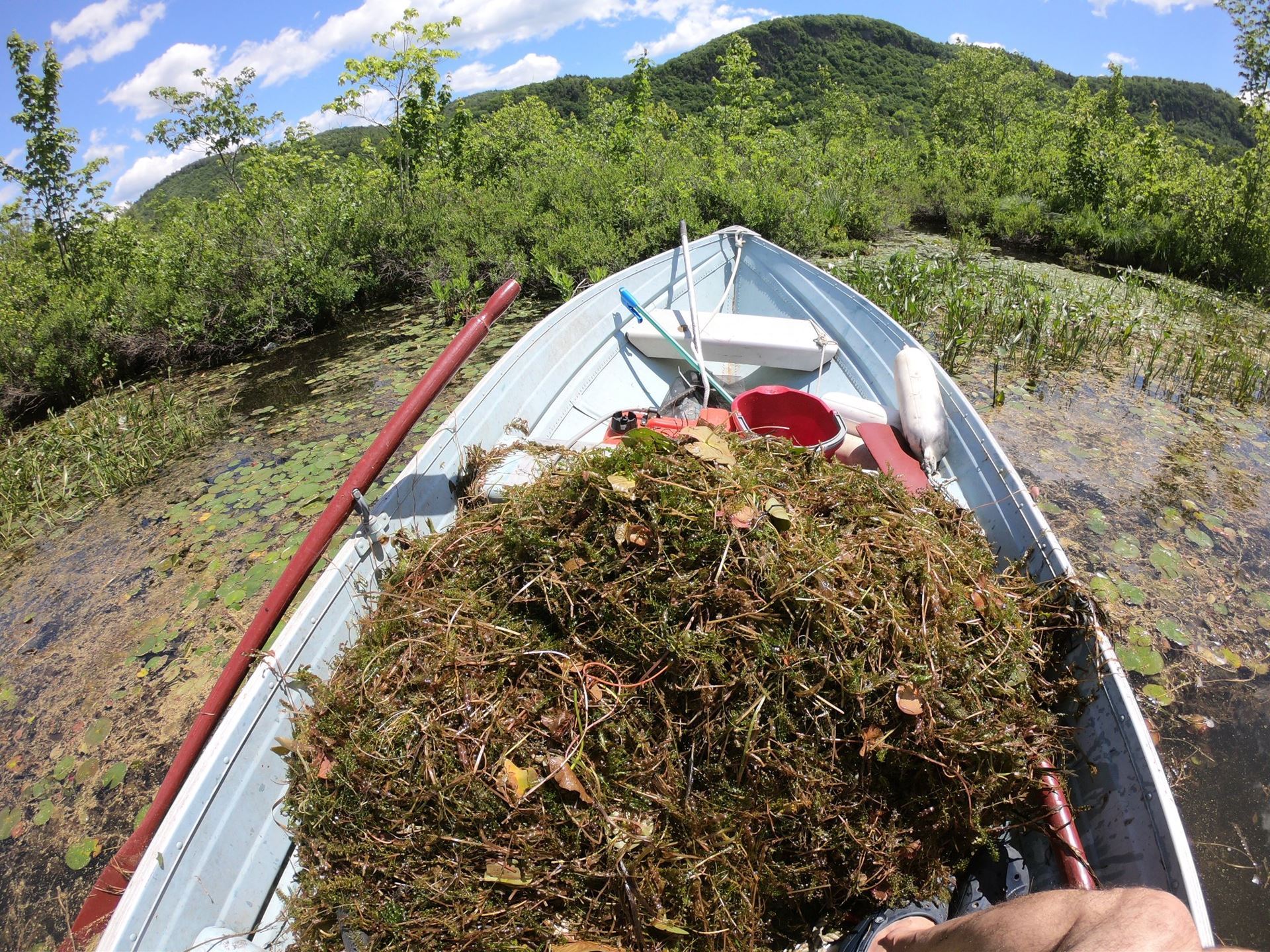
The Lake Wise Program
It was another great season for Lake Wise on Lake St. Catherine!
Lake Wise is a program developed by Vermont’s Lakes and Ponds Program to recognize outstanding efforts by homeowners who live along a lakeshore to protect the water quality and habitat along the shoreline and within the near-shore area of the lake.
Stormwater has a widespread environmental impact which makes it a growing concern in Vermont. In a statewide effort, towns and local organizations are working to implement large scale projects to help clean stormwater before it enters water bodies. Work is being done from the headwaters all the way down to the stream outlets. Excess nutrients in the water contribute to problems which affect both human and wildlife health including; lower oxygen levels in the water, toxic algae blooms, and excessive plant growth.
This season, the LSCA again earned a grant from the Lake Champlain Basin Program (LCBP) to perform Lake Wise assessments, and to help property owners with projects on their land to mitigate stormwater runoff into the lake. The LSCA was happy to again partner with the Poultney Mettowee Natural Resources Conservation District (PMNRCD) on this project, along with new partner Castleton University.
Click here to read all about the Lake Wise Program on LSC: https://lakestcatherine.org/lake-wise-program
The PMNRCD crew completed a tremendous amount of work in support of the Lake Wise Program this season. They were also able to leverage their Lake Education Action Program (LEAP) program, which pairs student and community lake education with the implementation of small planting projects for shoreline owners to increase the amount of projects completed.
Building on the work of previous years, and the efforts of 2022, 10 property owners earned the Lake Wise Award this year! This brings the total number of Lake Wise Award properties on LSC to 26.
Our 2022 Lake Wise Award winners are:
- James Giery, West Lake Road, Wells
- David Mook & Marcia Angermann, Ferncliff Road, Poultney
- Autumn Webb, West Lake Road, Poultney
- Mike & Karla Dendor, Clayton Tract, Wells
- Janet Burchett, Ferncliff Road, Poultney
- James Canders, West Lake Road, Wells
- Bonnie Fielding, Kinni Kinnic Lane, Poultney
- Marcia and Steve Turcina, Cones Point Road, Poultney
- Jane Adams, Cones Point Road, Poultney
- Carol Higgins, Grace Wood Way, Wells
Congratulations to this year’s Lake Wise Award winners!
Thank you to all the winners and Lake Wise participants for the work they have put into their property in an effort to become Lake Wise. This work represents a model of what all LSC lakeshore owners should strive for, as these projects are both beautiful and lake friendly.
All winners will be receiving the Lake Wise Award plaque that they can proudly display on their shoreline. Keep an eye out for them as you cruise around the lake next season.
The LSCA would like to help other Lake St. Catherine property owners implement best practices to mitigate stormwater on their properties, and help them to earn the Lake Wise award. To date, over 80 properties have participated in the Lake Wise Program, and have at least received an initial assessment. If you would like to have your property assessed, please email us at info@lakestcatherine.org.
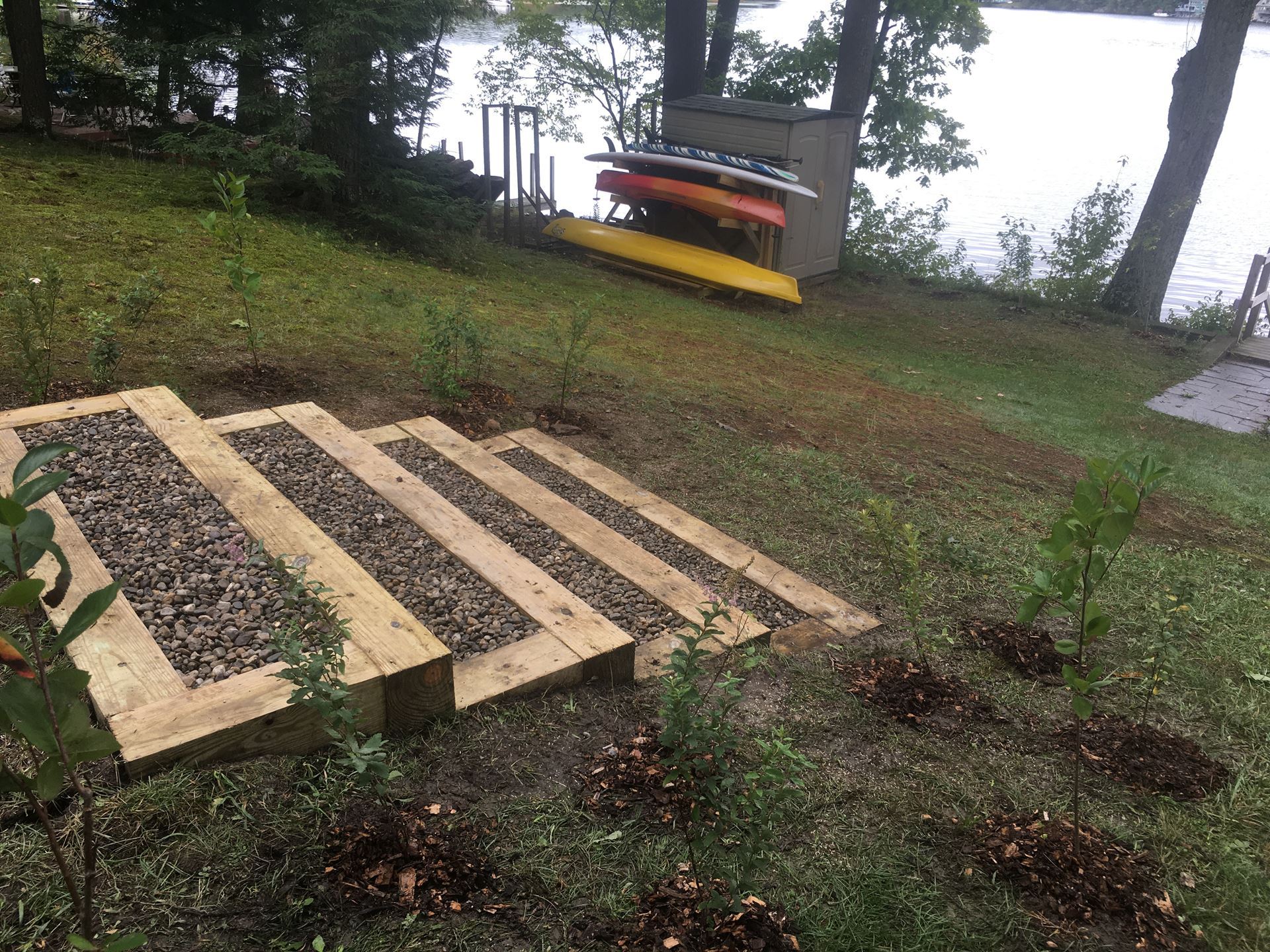
The Lake St. Catherine Stormwater Master Plan
In 2018 and 2019, extensive field work by the PMNRCD and Fitzgerald Environmental Associates took place in the LSC watershed. The goal was to identify sources of increased stormwater runoff and associated sediments and nutrients flowing into the lake. Phosphorus reducing projects are of particular importance given the water quality concerns within the watershed. The work involved identifying sources of stormwater, prioritizing sources based on various environmental, economic, and social criteria, and designing projects to mitigate those sources. This resulted in the creation of the Lake St. Catherine Stormwater Master Plan (SWMP).
50 potential sites were identified, and as of today, 4 projects have been implemented, and 2 others have been designed and are awaiting installation. Projects have recently been completed on North Street, Ferncliff Road, the boat launch in Wells, and at the Wells Lakeside Park. That leaves 44 others that need to be evaluated, designed, and implemented.
In early January, we were informed that we had earned part of a $100k grant being administered by the PMNRCD from the LCBP. $50,000 of this grant will be used directly for Lake St. Catherine to design Stormwater Master Plan Projects on LSC.
The goal of our approved grant in 2023 is to develop 10-12 projects identified in the Lake St Catherine Stormwater Master Plan to be ready for implementation during the first round of Clean Water Service Provider formula grant funds in 2023 and thereafter. Our Project Team, consisting of the LSCA, PMNRCD, local partners, and the selected consultant, will identify a list of high and medium priority projects and develop 30% conceptual designs for those that rank within the top 10-12. Included with the conceptual designs will be detailed budget estimates, anticipated permitting needs, and preliminary landowner agreements or letters of interest. We hope to have a meeting soon with the lake community to select the top projects to be developed.
You can read more about the SWMP, and view an interactive map with the identified sites by visiting our Stormwater Master Plan page: https://lakestcatherine.org/stormwater-master-plan
The Lake St. Catherine Watershed Action Plan
In May of 2021, the LSCA earned a grant from the LCBP to help fund the creation of a Lake Watershed Action Plan (LWAP) for Lake St. Catherine.
From the Environmental Protection Agency (EPA), a Lake Watershed Action Plan is described as:
“Watershed planning helps address water quality problems in a holistic manner by fully assessing the potential contributing causes and sources of pollution, then prioritizing restoration and protection strategies to address these problems.”
In partnership with the PMNRCD, the LSCA will use this 3-year grant to create an LWAP for Lake St. Catherine. The $38,224 awarded by the grant will allow the LSCA to hire and partner with lake experts to perform various in-lake and watershed based measurements, testing, and studies to identify current or potential future issues and design a comprehensive, long-term plan to address them. The resulting plan will leverage current LSCA investments in water quality and pollution prevention, be driven by accepted best management practices, elevate under-assessed areas and gaps, and will identify issues, opportunities, and projects to guide locally-led water quality implementation work in the Lake St. Catherine watershed.
After many years of successfully managing individual lake programs which include: in-lake invasive species control, invasive species prevention, and stormwater management, the LSCA is now poised to integrate these programs into a broader watershed plan with a focus on the prevention of pollutant loads (phosphorus, nitrogen, sediments) that enter into the Lake from sources outside the waterbody. The LSCA plans to use the success of these building blocks to expand its work in the watershed and focus on prevention for the future.
A Project Team led by Trustees of the Association will engage the following partners:
- Poultney Mettowee Natural Resources Conservation District to do field work on the areas adjacent to the Lake to identify sources of pollutants and recommend 20 projects to address them.
- The Natural Sciences Department at Castleton University to use its environmental chemistry lab with access to water sampling supplies and instrumentation; Castleton undergraduate students to conduct broader in-lake and in-flow tributary water sampling and analyze the impact of major storm events. Students will help literature review of best management practices for water quality to sample collection, to water analysis, to data analysis, to GIS modeling.
- A Limnologist consultant and/or chemist will advise on lake nutrient cycling, lake functions, and assist with any in-lake studies, such as water chemistry, sediment testing, and measuring phosphorus concentrations.
- A series of community Stakeholders will be actively engaged to evaluate their part in understanding and mitigating excessive phosphorus and erosion around the Lake. These include: The Lake St. Catherine Conservation Fund; the Towns of Wells and Poultney, especially the road crews as well as zoning provisions; members of the Association and homeowners to enact prevention on their properties; the Vermont DEC who has agreed to co-sponsor an annual symposium on best practices; businesses and the lake community who use the Lake and surrounding area for recreation.
Using the data and information collected about the Lake St. Catherine Watershed, the Project Team will create the Lake St. Catherine Watershed Action Plan by the end of the grant period in 2024. This plan will identify “Opportunities For Action” and the strategies, interventions, and projects to best address them.
Subsequent grants will be requested to implement as many projects as possible and create a culture worthy of emulation that positions Lake St. Catherine for future funding that rewards water quality improvements including phosphorus load reduction. These efforts will continue for the balance of the decade and be the most important contribution all those who love being at Lake St. Catherine can do to distinguish its future beauty and health.
Preliminary work began this year, including our first stakeholder meeting at the Wells Lakeside Park on July 14th. The lake community was invited to join us, and representatives from PMNRCD, Castleton University, and Fitzgerald Environmental Associates for a presentation introducing and outlining our plans for the LWAP. Field work will begin in 2023.
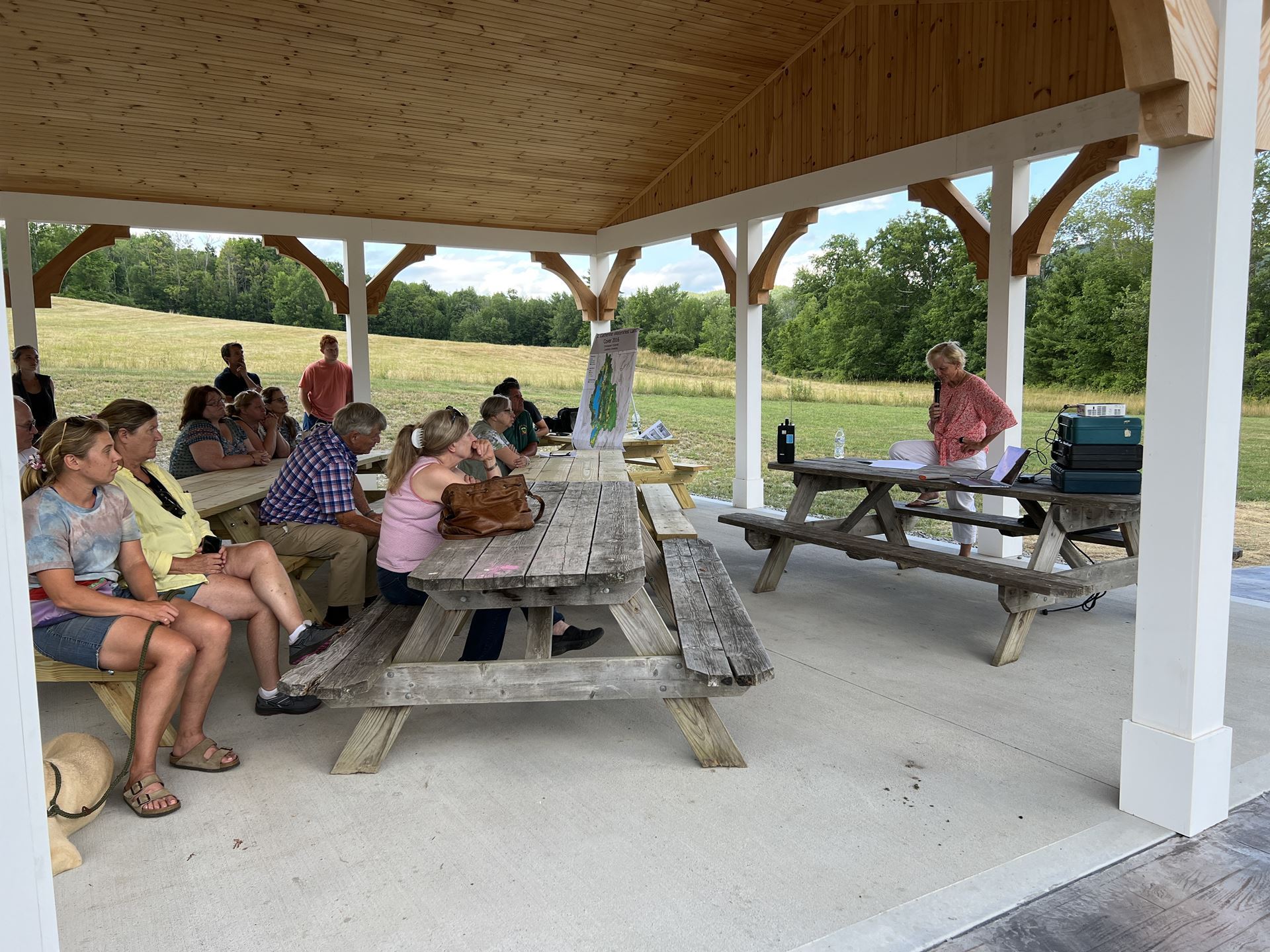
Greeter Program - Boat Launch Monitoring
Our Greeter Program is very important to the health of Lake St. Catherine. Our Greeters have been trained to identify aquatic invasive species (AIS) - like spiny waterflea, asian clams, water chestnut, starry stonewort and zebra mussels - to stop them from entering LSC at the boat launch in Wells and the State Park in Poultney. They also educate boaters about the importance of looking for these invasives on their boat or trailer so they are not spread to LSC or another lake. Each year, they do a fantastic job checking vessels and educating the lake community on the dangers of invasive species for Lake St. Catherine. They are on duty from Memorial Day through Labor Day - working on Friday, Saturday and Sunday. They also cover holidays and fishing tournaments.
In total, our Greeters inspected 1960 boats this year at the boat launch in Wells, and at the State Park in Poultney. This is more than double the number of vessels they inspected last year. Boat launches were down in 2021, most likely due to numerous rainy weekends last season.
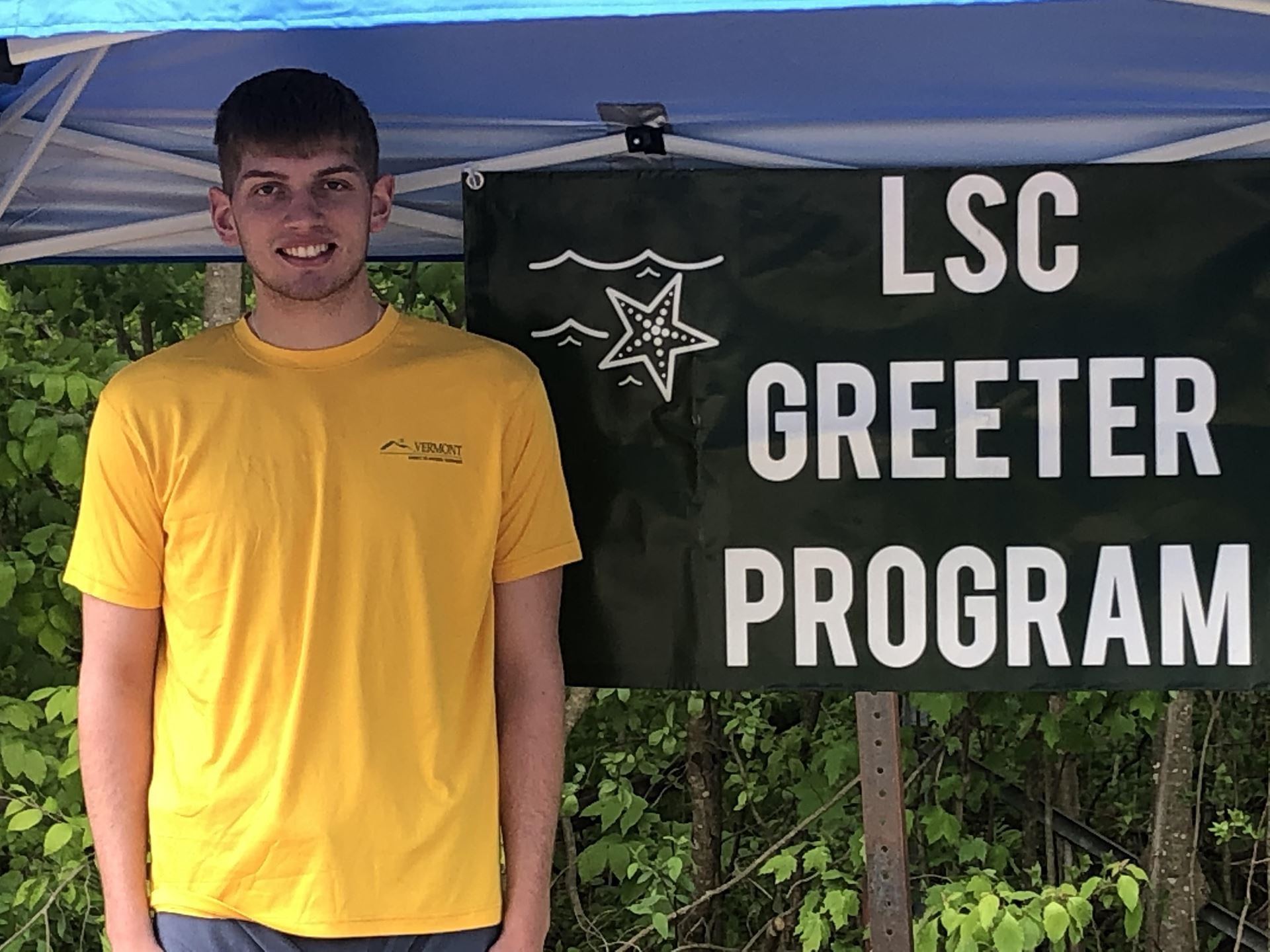
Milfoil Control Program
Each season, the LSCA implements a Milfoil Control Program to keep milfoil in check in Lake St. Catherine using a combination of spot herbicide treatments and DASH (Diver Assisted Suction Harvesting).
The LSCA’s Milfoil Control Program consists of four components:
1. ‘Stop The Spread’ education and outreach. Our ‘Stop The Spread’ campaign educates boaters and property owners on best practices to limit the spread of milfoil. Each year, the LSCA holds a lake community meeting to discuss the control plan for the season, answer questions, and hand out a flyer with best practices for lake users to limit the spread of milfoil.
2. Volunteer milfoil cleanup. Throughout the season, we organize volunteers to collect detached floating milfoil from the lake and deposit it on our designated drop off platforms. The milfoil is then picked up from the platforms and disposed of. We also encourage boaters and property owners to remove any milfoil they see in the lake while boating or on their shoreline.
3. DASH - Diver Assisted Suction Harvesting. Our DASH crew suits up in scuba gear and hand-pulls milfoil by the roots from the lakebed. In sections of lower milfoil density, they will swim the area and hand-pull with mesh bags. In higher density areas, they will set up the DASH equipment which allows them to suction the hand-pulled milfoil up through a tube to a catch table on a boat. Milfoil is then placed in 17.5 gallon buckets for transport off the lake.
4. Herbicide spot treatments with ProcellaCOR EC. In order to maximize our DASH crew’s time, effectiveness, and number of acres covered, one of our control methods includes spot treatments with the herbicide ProcellaCOR EC. We’ll further discuss ProcellaCOR later in this article. When the lake is spot treated by herbicide, the State recommends that the lake not be used for any purpose on the day of the treatment. Normal recreational and domestic (household) lake water use may resume the next day after treatment, and use of lake water for irrigation may resume 1 week after the treatment.
These efforts led to another successful year of milfoil control on Lake St. Catherine, and have resulted in the lowest percentage of milfoil cover and frequency of occurrence in the lake since the mid-2000s. Also, and just as importantly, we have seen many species of our native aquatic plants that have been suppressed by milfoil growth like Water stargrass, Tape grass, Thin-leaf pondweed, Illinois pondweed, Common waterweed, and Robbins’ pondweed have all increased in frequency of occurrence. You can view our Aquatic Vegetation Management Reports dating back to 2001 here.
These results are exactly what we want to see!
Lake St. Catherine has over 30 native aquatic plants which are important and necessary to sustain a healthy lake ecology. Our efforts are focused on reducing the amount of milfoil in the lake so that these native aquatic plants can grow as they normally would. Keeping milfoil under control is helping to return the aquatic plant environment to conditions before milfoil was introduced in the 1970s. Because of our milfoil control efforts, we again have a complex and diverse native aquatic plant community.
In late September, our contractor SOLitude Lake Management performed a comprehensive, 2 day lake-wide aquatic vegetation survey to both evaluate the performance of our milfoil control efforts, and to assess the overall state of aquatic plants in Lake St. Catherine.
Back in 2001, 199 GPS points were plotted throughout Lake St. Catherine, and these points are evaluated for aquatic plants during each report. This is the 19th consecutive year a plant survey has been performed on Lake St. Catherine. You can see all the previous reports, dating back to 2004 in our Links & Downloads section.
The full report can be read here: 2022 - Aquatic Vegetation Management Report. We encourage you to take a few moments to read through the whole report.
Based on the data, and the results we've all seen throughout the whole of Lake St. Catherine, our Milfoil Control Program had a very successful year. The ProcellaCOR treatments were highly effective, our DASH team did another great job this year (252 buckets of milfoil removed), and you got involved as well by participating and volunteering to collect floating milfoil from June through October as part of our Milfoil Cleanup Community Day. These collective efforts are making a difference!
In early May, the lake will again be surveyed for milfoil growth. At that point, a final treatment map will be created which will show the areas to be addressed.
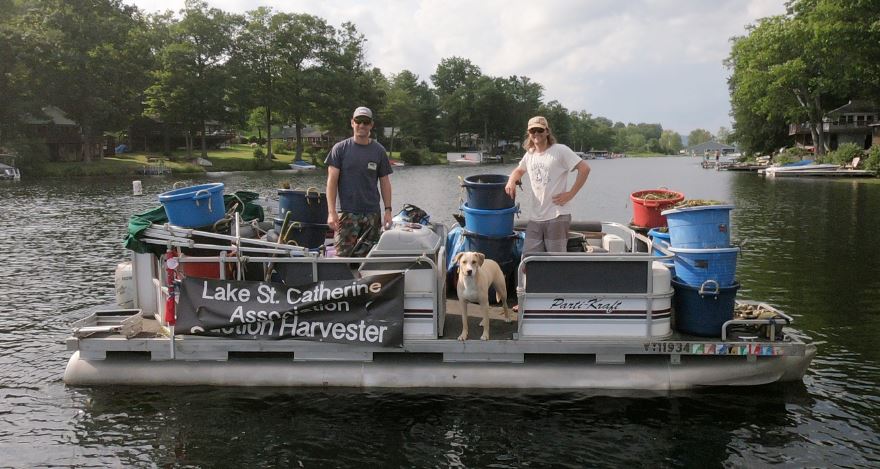
Sponsor Spotlight
We’d like to thank the 16 businesses who were LSCA Business Sponsors in 2022!
Our $200 Business Sponsor membership includes a listing on the Sponsors page of our website, a listing in our spring and fall newsletters, and a Sponsor Spotlight in June on our website and Facebook pages.
Thank you: A-1 Sewer & Drain Service, A113 Productions, Aerus Water and Air Purification, Bird Dog Home Inspection, Catherine Capers, Haun Welding Supply, Lake St. Catherine Cottages, Lake St. Catherine Country Club, Lakes & Homes Real Estate, Liebig Berries, Merritt Environmental Consulting, New England Lakeside Realty, Rathbun's Maple Sugar House, VT Lakehouse, Williams Hardware, Woodard Marine.
If you’d like to become a Business Sponsor in 2023, please let us know!
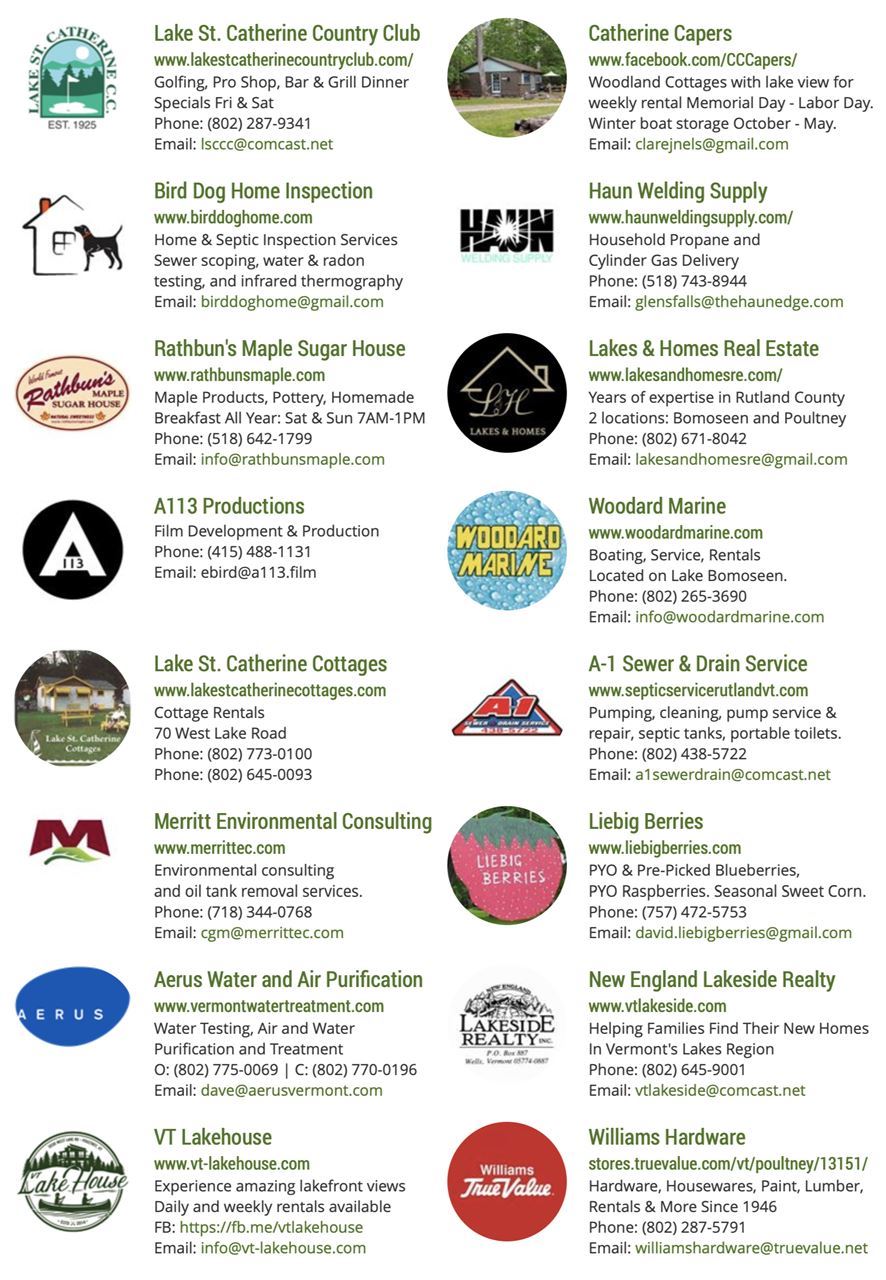
Boating Safety Classes & Lake Safety
The LSCA was happy to be able to again provide free boating safety classes for those in the lake community who wanted to get their boating license. Anyone born after January 1st, 1974 must successfully complete an approved boating safety education course to legally operate any motorized vessel - including personal watercraft.
Frank Callahan, Trustee in charge of Boating Safety, conducted the 2 free courses - in June & July. 19 lake community members earned their license this year.
The LSCA also places and maintains no-wake zone and marker buoys throughout the lake. In 2022, the Lake Safety Committee began building newly designed markers to replace the aging ones, and will complete the upgrade in 2023. Thank you to our ‘Buoy Buddies’ around the lake who assist us each year with the spring installation and fall removal of the markers and buoys.
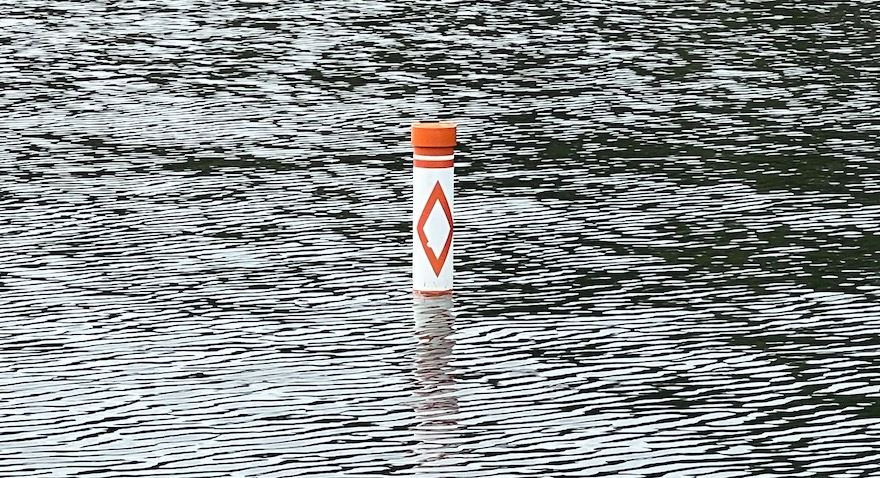
Libraries Love Lakes
The Wells Village Library, the Lake St. Catherine Association (LSCA) and the Lake St. Catherine Conservation Fund (LSCCF) joined forces to bring the lake community a very exciting event!
On July 3rd at the Wells Lakeside Park, the Libraries Love Lakes event took place, offering family-friendly opportunities for stewardship-based, hands-on, lake-related learning. Ecology-based topics like native flora and fauna, stormwater impacts and natural history were all on the agenda, including real-time water quality assessments in which guests can participate, expert presentations, and pontoon boat tours.
The families received a lake-themed kit replete with on-topic books and activities.
Presenters included:
- Wells Village Library
- Lake St. Catherine Association (LSCA)
- Lake St. Catherine Conservation Fund (LSCCF)
- Castleton University
- Poultney Mettowee Natural Resources Conservation District (PMNRCD)
- LSCA's Greeter Program
- LSCA's Diver Assisted Suction Harvesting (DASH) team
- Wells Historical Society
- Loon Biologist Eric Hanson from Vermont Center for Ecostudies
Libraries Love Lakes is a national outreach project which pairs school and public libraries with lake scientists to provide collaborative programming emphasizing the importance of lakes in our everyday lives. You can learn more by visiting www.librarieslovelakes.org.
To help fund this event and ongoing collaboration among the library and lake organizations, the LSCA applied for and received an Education & Outreach grant from the Lake Champlain Basin Program (LCBP) funded by the New England Interstate Water Pollution Control Commission (NEIWPCC).
The lake-related learning continued at the Wells Village Library, as a new section of the library called the 'Lake St. Catherine Collection' was unveiled with a reception at the library on September 17th. The collection curated by librarian Gina Ellis includes books, activities, experiments, iPad apps, models, and science tools like dip nets and binoculars that can be borrowed. Materials to learn from are available for all ages. Be sure to stop in to the library to check out all the lake & stewardship themed materials.
Thank you to everyone who contributed to make this wonderful event on LSC a success!
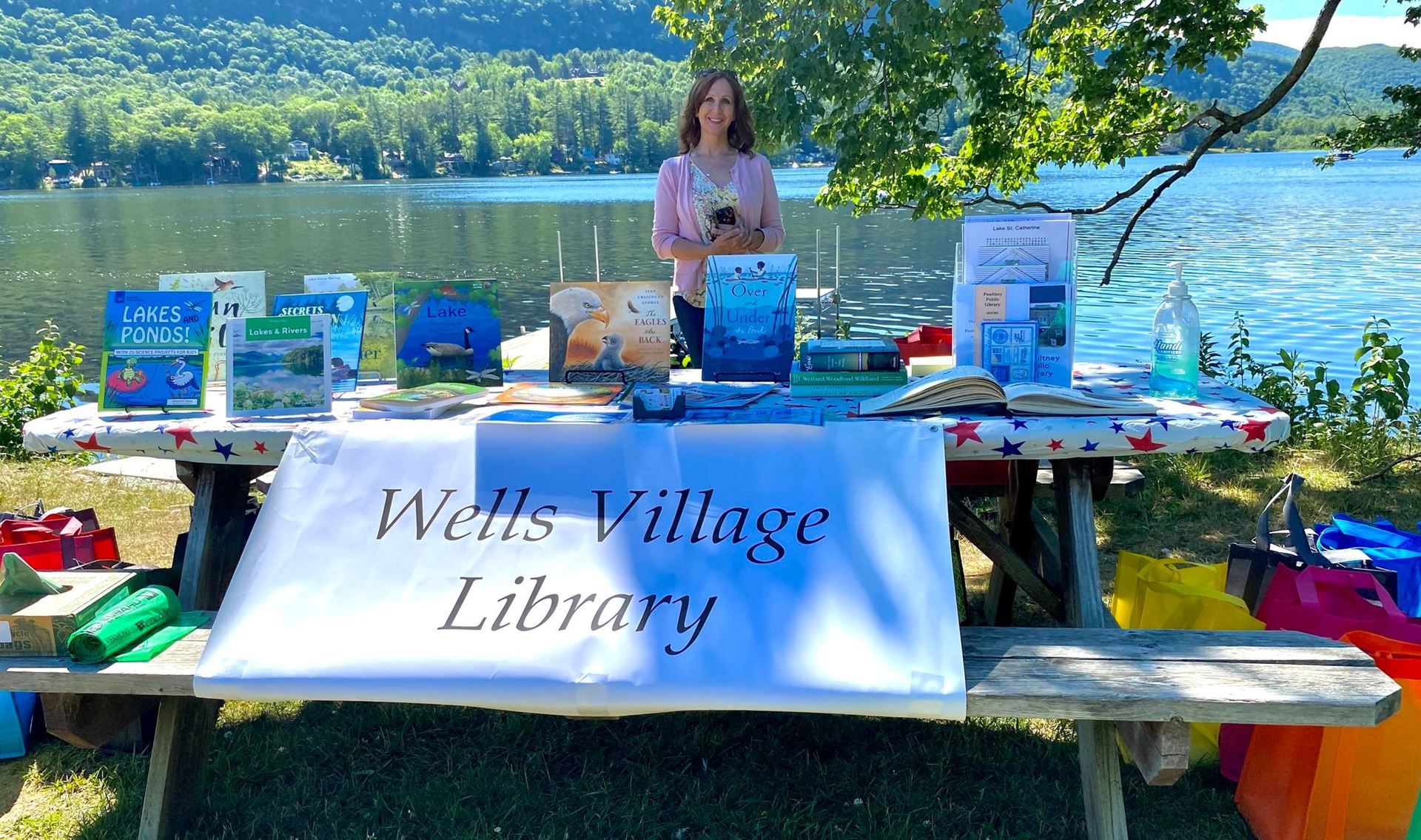
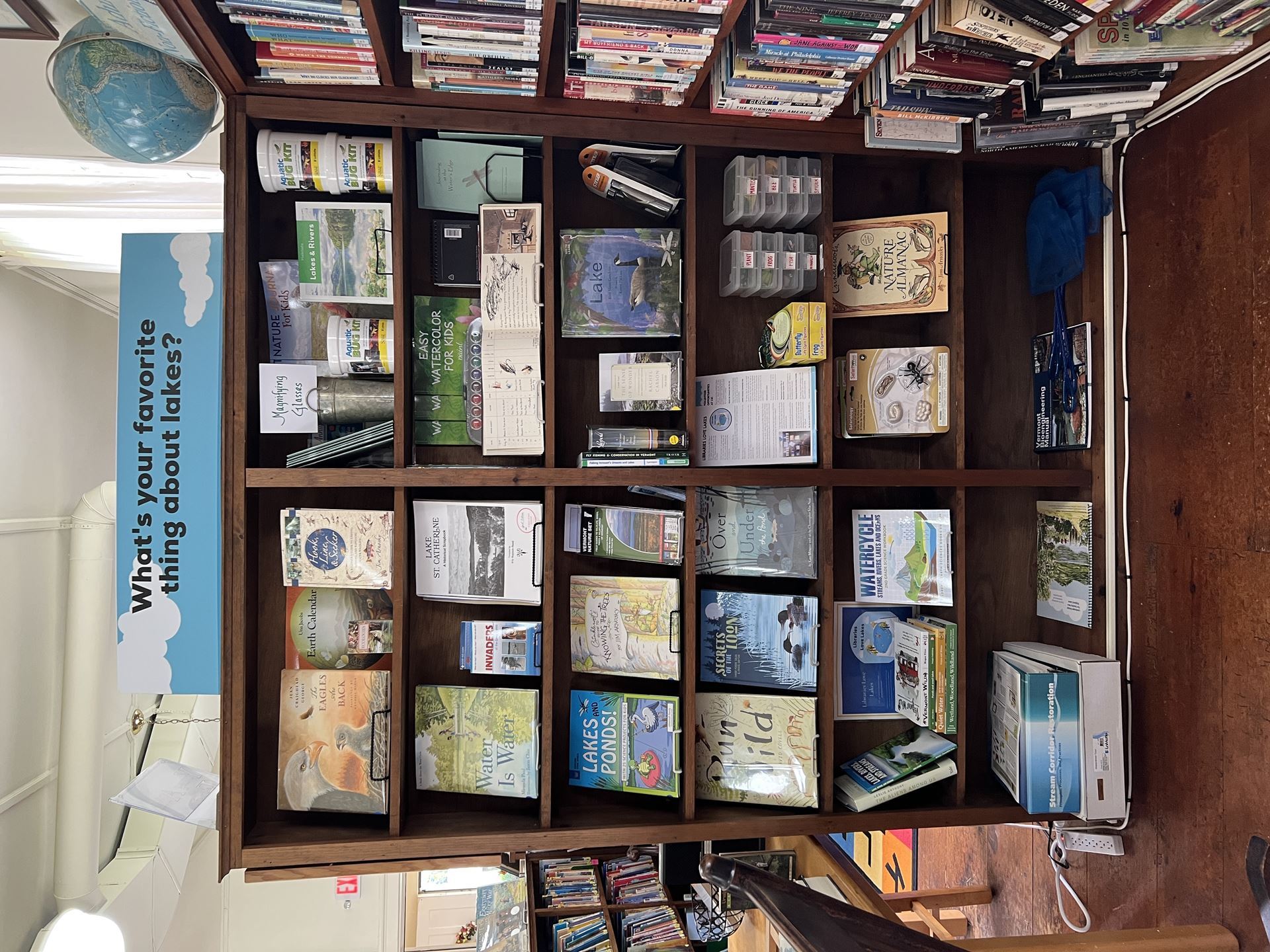
The LSCA's 10th Annual Boat Parade
We had another great boat parade this year!
18 boats registered, 14 participated, and 22 people voted online for their favorite boats in our 4 categories: most patriotic, funniest, most original, best overall.
Our winners were:
Most Patriotic:
Boat #6 - God Bless America - Adam Wunderlich
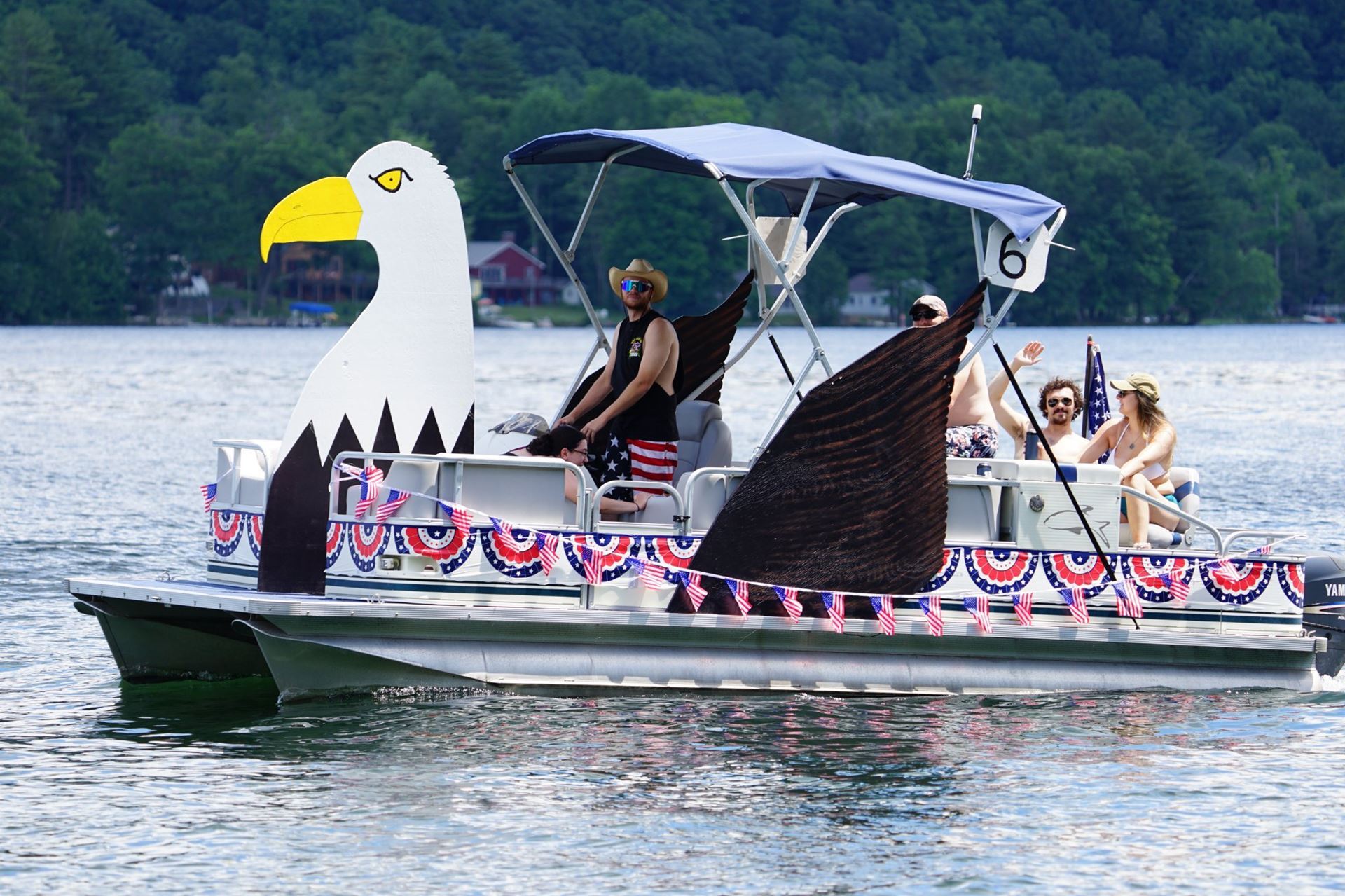
Runner up:
Boat #18 - Patriotic - Ryan Bagley
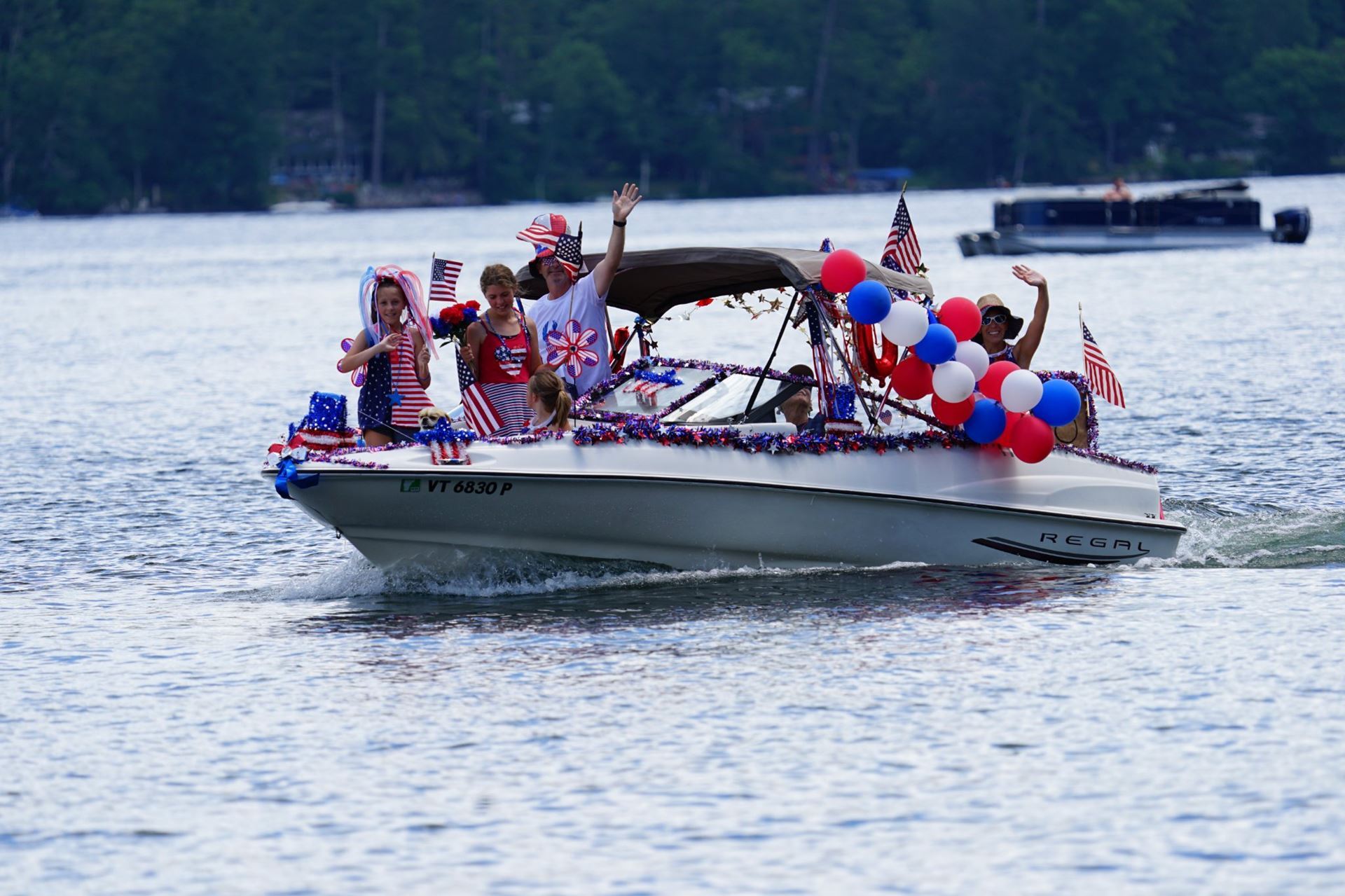
Funniest:
Boat #7 - Monster Mash - The Ramirez Family
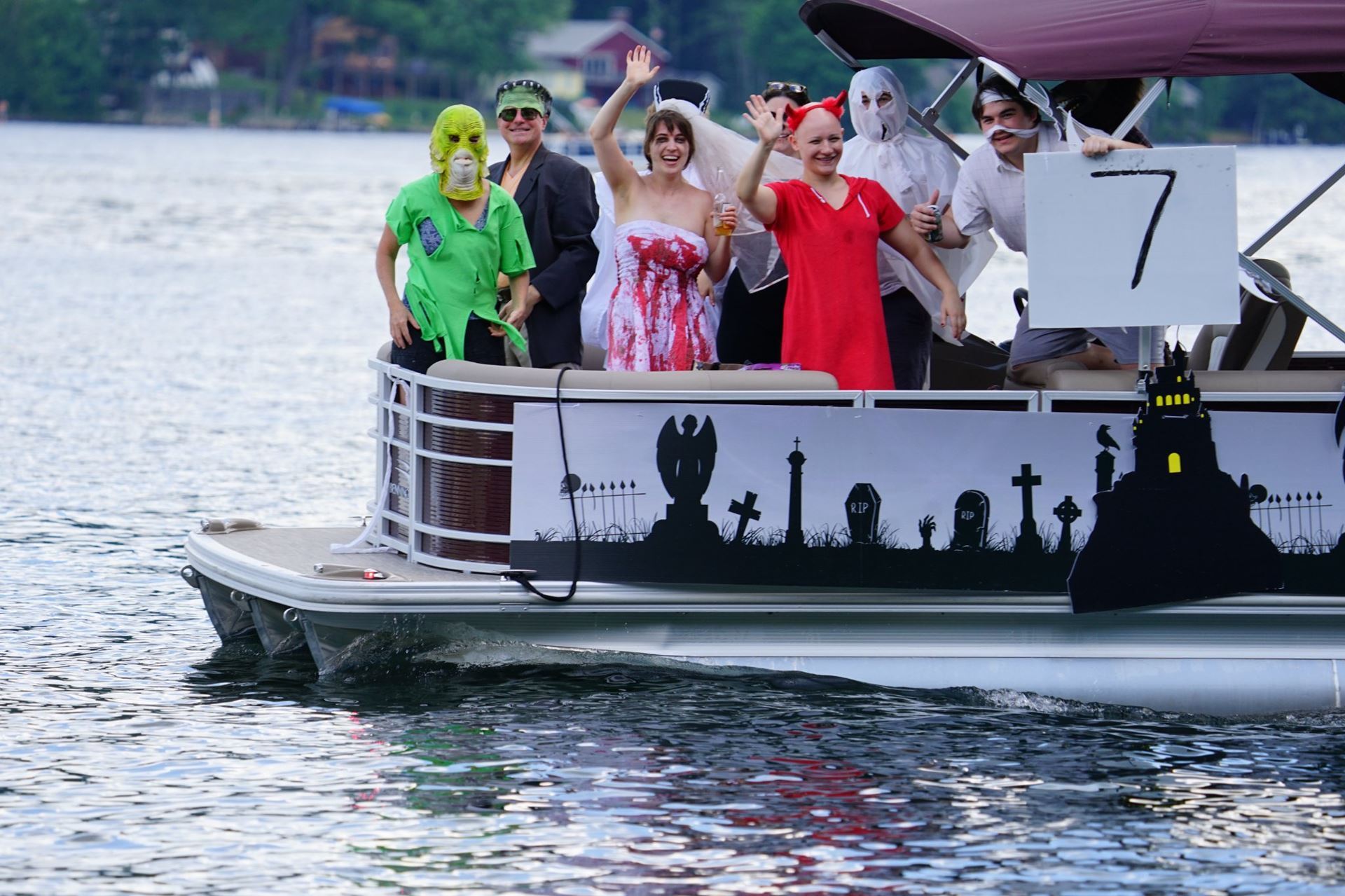
Runner up:
Boat #13 - Groovin On The Lake - Mike & Chris Gay
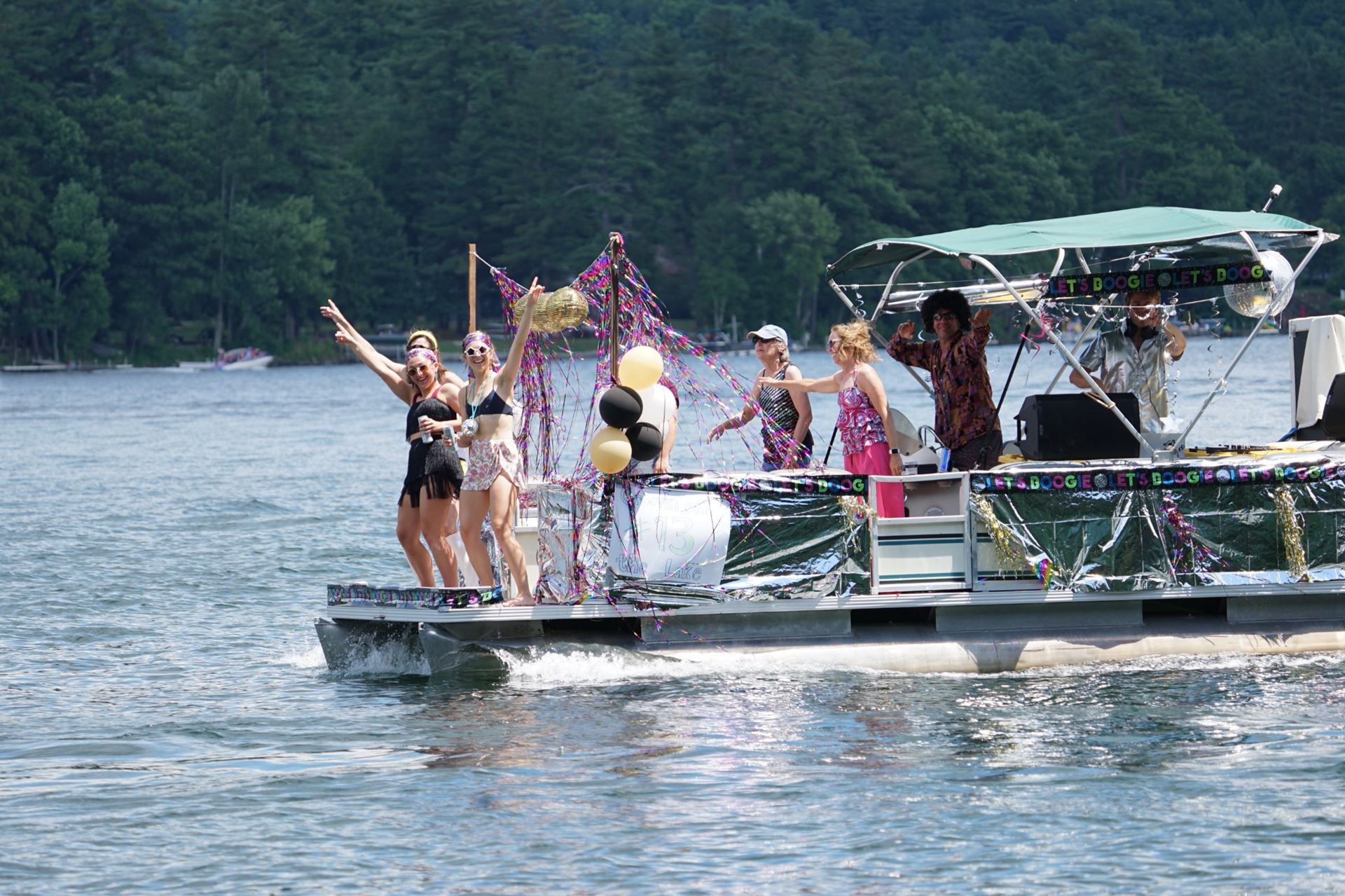
Most Original:
Boat #12 - RMS Titanic - Goldman Family
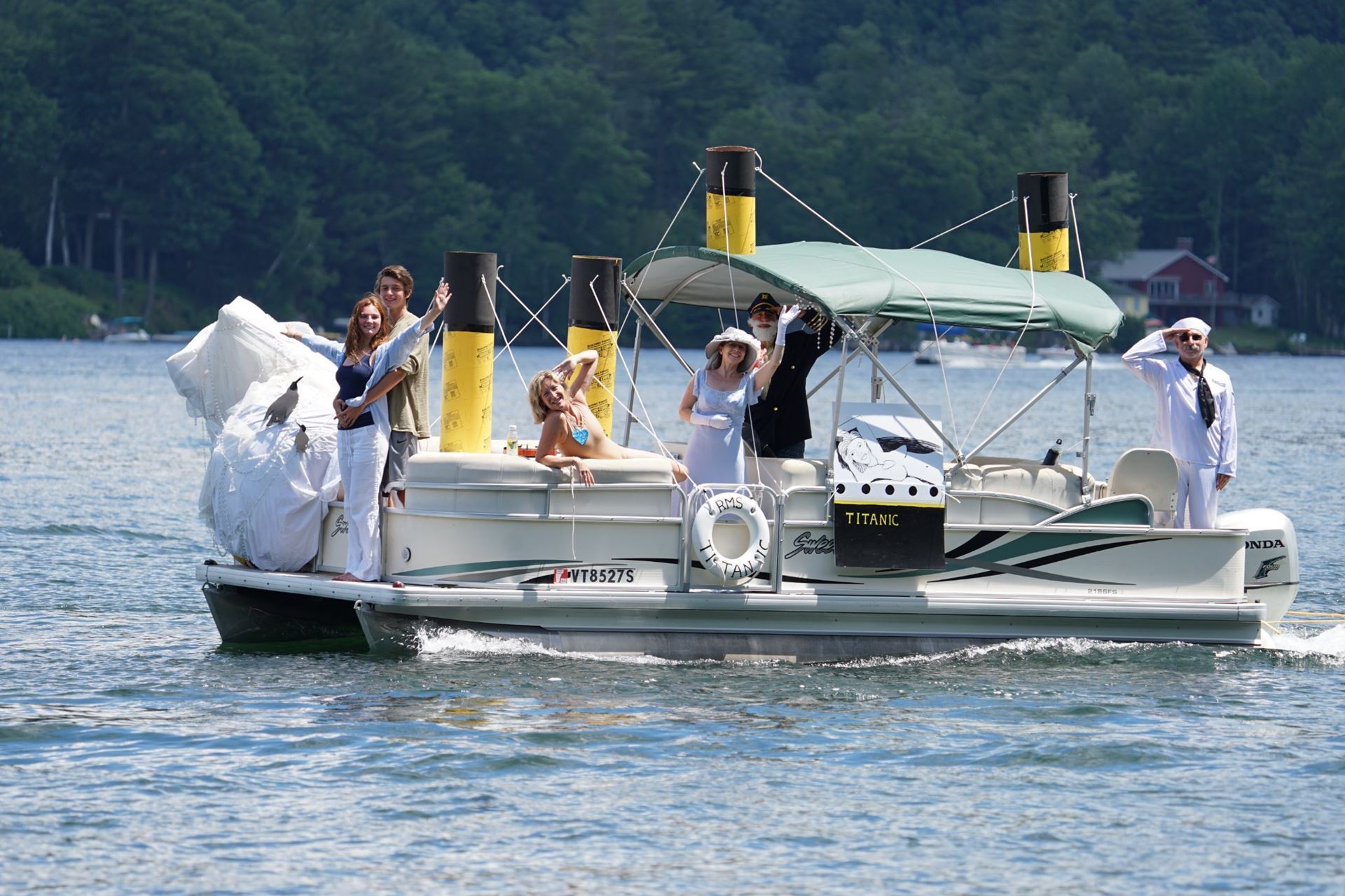
Runner up:
Boat #10 - Lake Saint Catherine Fire Boat - Wysolmerski Family
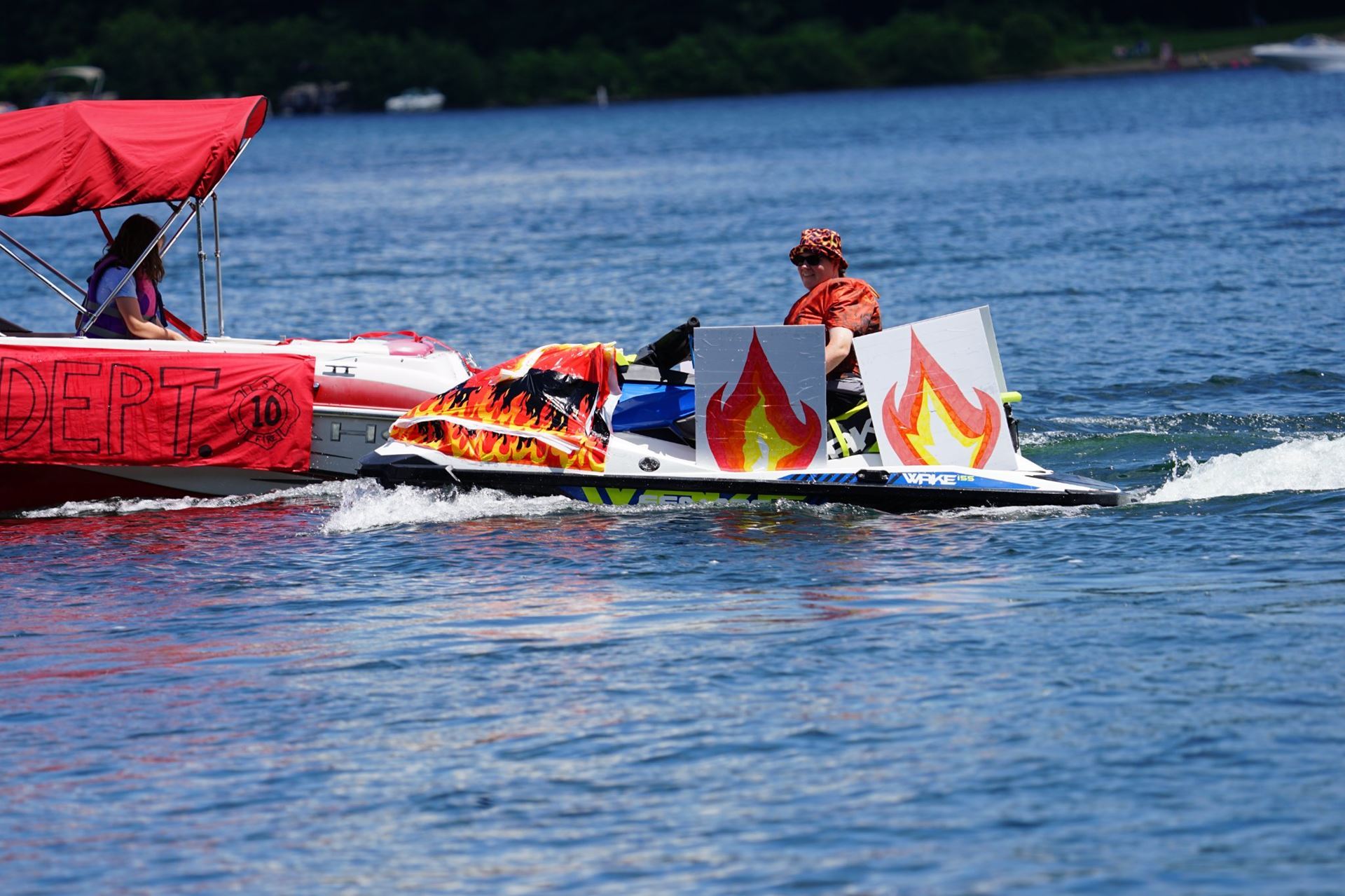
Best Overall:
Boat #3 - Moana - Megan Frueh
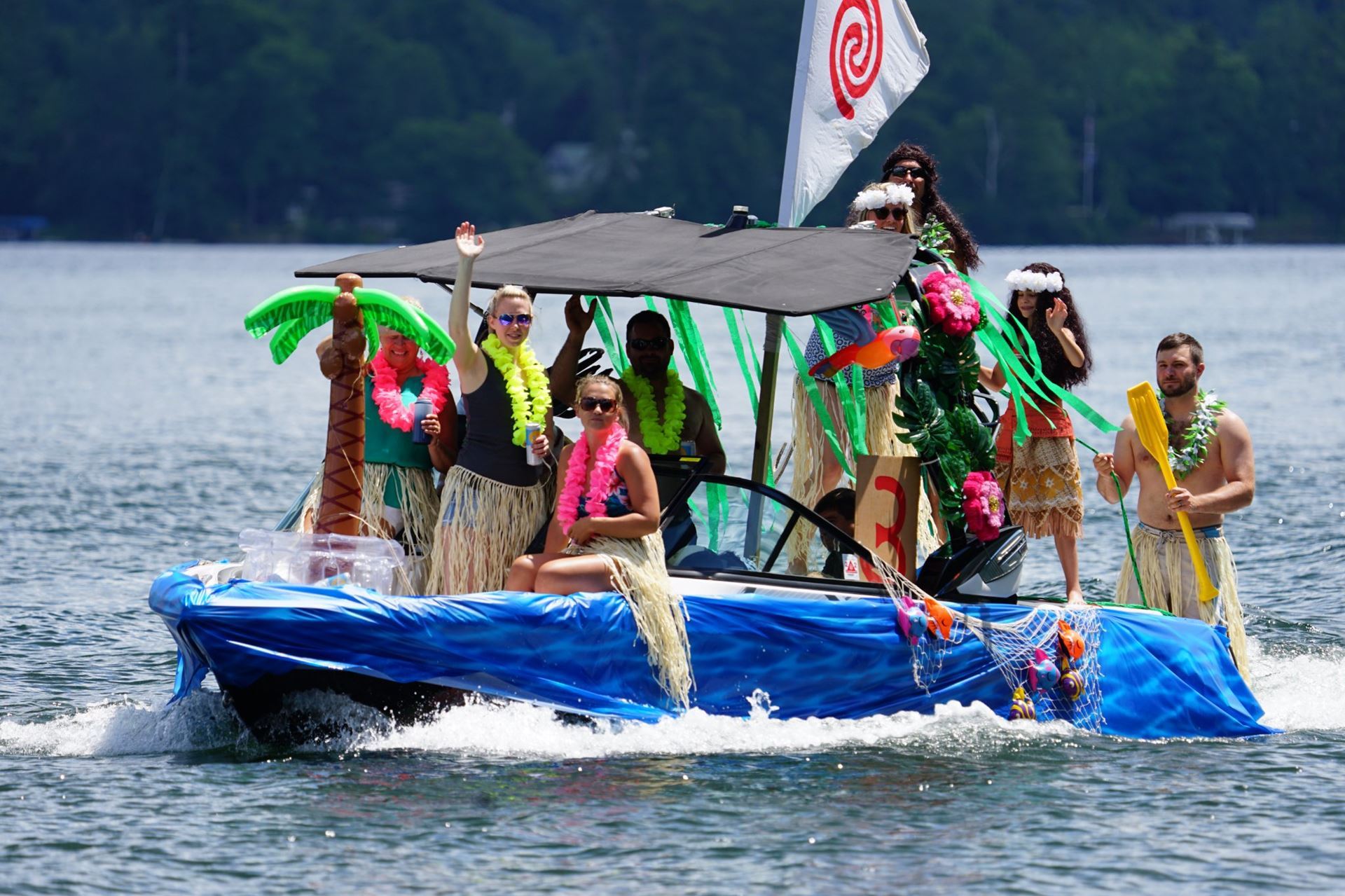
Runner up:
Boat #4 - Pirates Secret - Mary Papasso
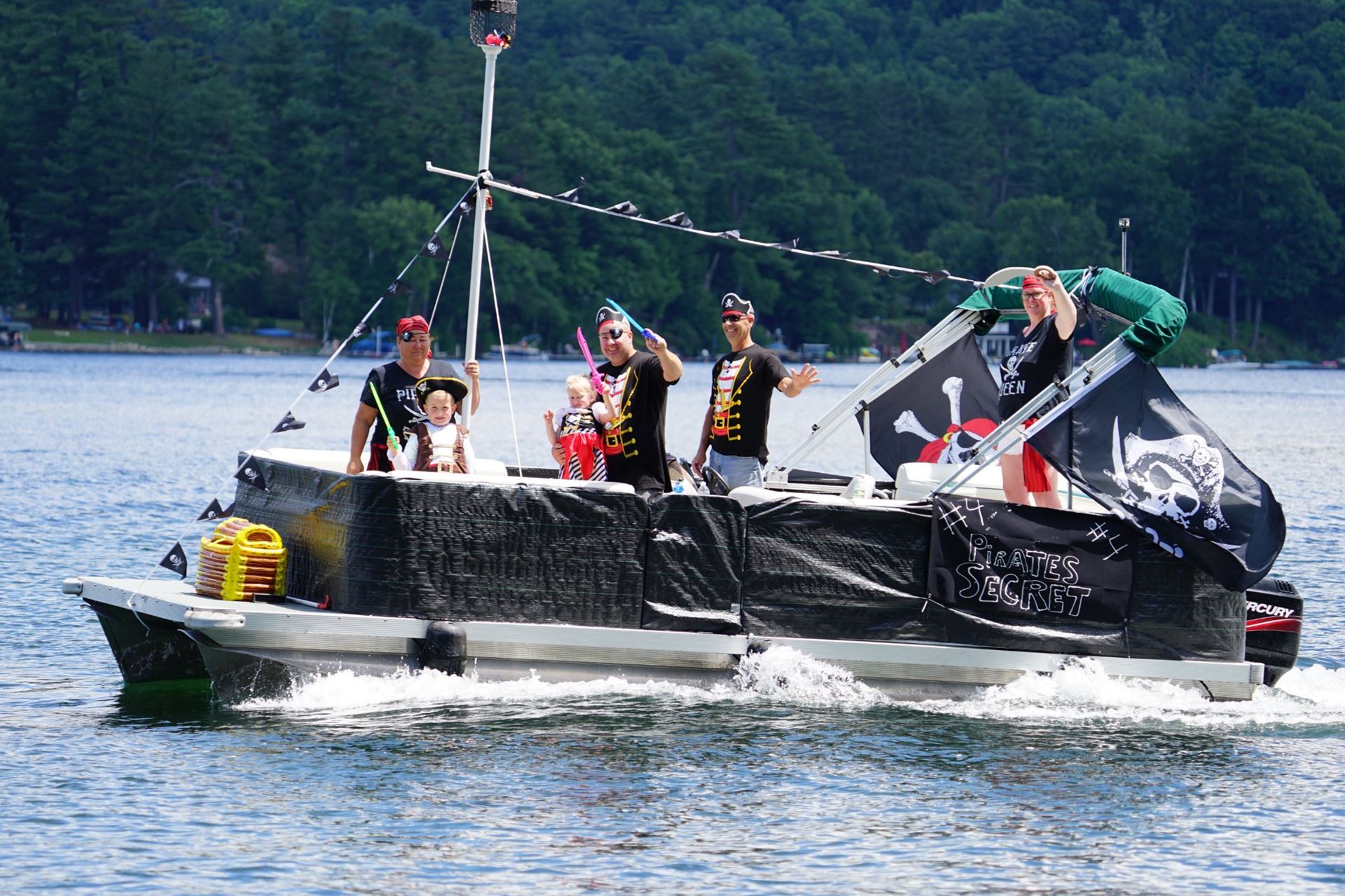
Thank you to all who participated, to those who cheered from their boat and from the shore, and to everyone who voted! We are looking forward to our 11th year in 2023!
Wastewater Workshop
On July 11th, at the LSC Country Club, the LSCA hosted a 'Wastewater Workshop' presentation by Cristin Ashmankas, Environmental Analyst with the State of Vermont’s Department of Environmental Conservation, Drinking Water & Groundwater Protection Division.
Cristin talked about the basics of septic systems: how they work, why they are so important, how they fail, and how to properly maintain them. She also outlined how they are designed, and the many different types of systems that are available - including innovative and alternative systems that can be used in unique situations.
She also discussed the rules, where to get help, and why it is so important that systems be fully working around the lake.
Her presentation, and contact information is available on our website here. If you have any septic system questions, please reach out to Cristin, she would be happy to help!
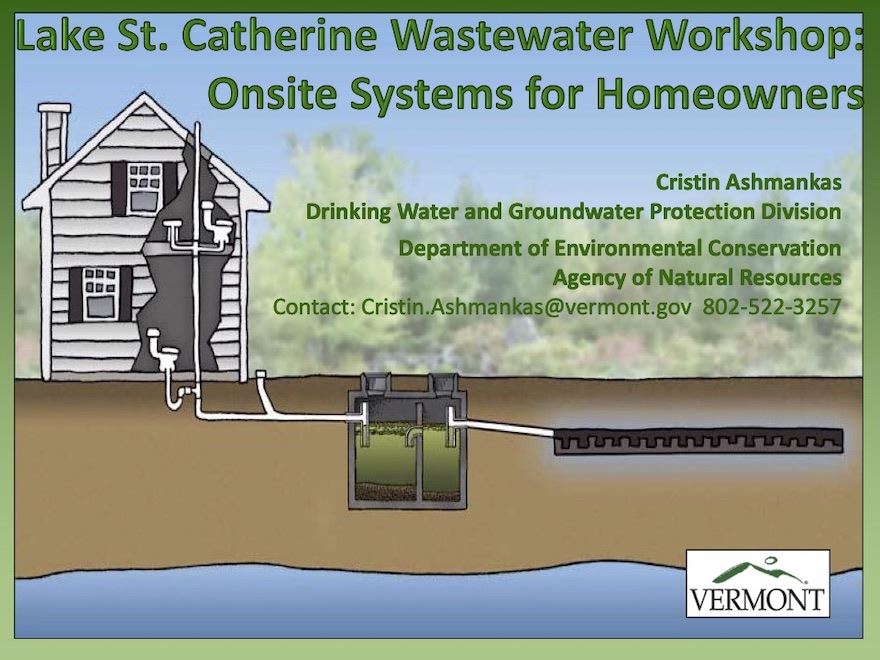
LSCA's Annual Meeting & Dinner
Thank you to the tremendous group we had at the Lake St. Catherine Country Club on Saturday, July 23rd for the LSCA's 2022 Annual Meeting & Dinner. It was great to see so many of you who care so much about LSC. What a crowd! We hope you enjoyed our presentation, your meal, and your evening with your lake neighbors.
We'd also like to thank the Lake St. Catherine Country Club staff for their excellent service and a wonderful meal, Eric Hanson from Vermont Center for Ecostudies for his fantastic presentation on loons, and to our Trustees for their excellent reports from their committees, and their hard work for Lake St. Catherine.
You can see photos from the evening and view the full presentation on our website Blog.
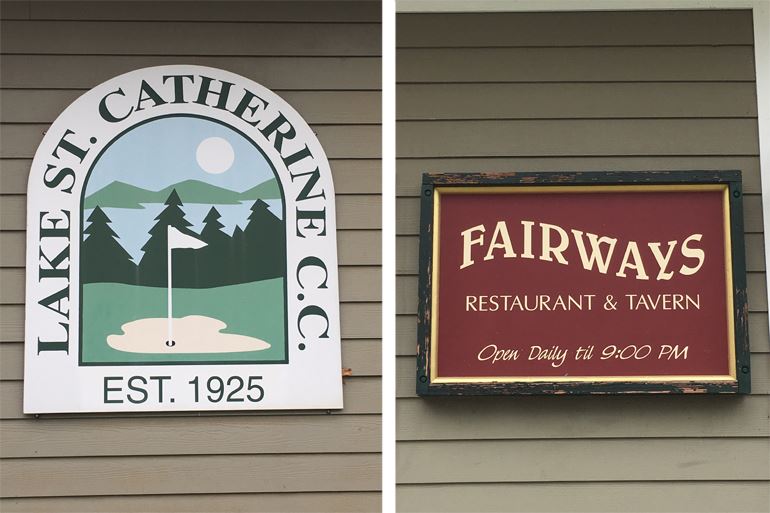
Dockside Chats With The LSCA
Dockside Chats began in 2020 as a way to have safe, face-to-face interactions with members around LSC to discuss lake related issues. We invited lake residents to schedule a Dockside Chat with a LSCA Trustee who would meet you at your dock to chat about the lake. These were again very popular in 2021, so we continued the program this year. 8 Dockside Chats were scheduled this year. Let us know if you’d like to get a chat scheduled for next season by emailing us at info@lakestcatherine.org.
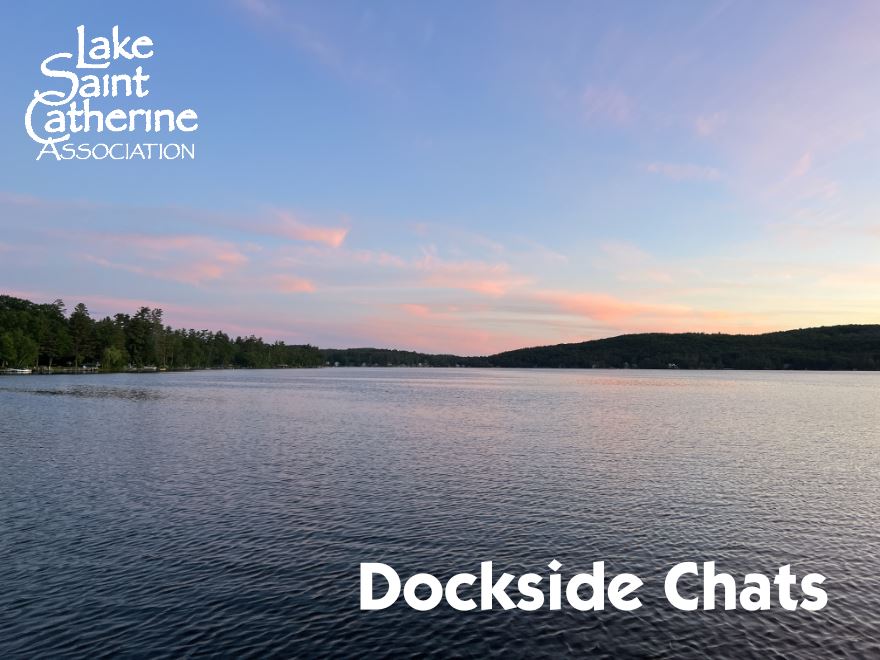
LSCA Newsletters
Our traditional Spring and Fall newsletters were posted digitally on our website, and printed copies were made available at Wellsmere Farm in Wells. If you missed them when they were released, you can read them here:
Spring Newsletter
Fall Newsletter
Keeping You Up-To-Date
As soon as we have Lake St. Catherine news, we like to inform the lake community as soon as possible by posting it on our website Blog, and on our Facebook page. So, keep an eye on these sites for all the latest information on LSC. We also send out news summaries via email updates to our members who have shared their email with us - so please be sure to provide your email address when you become a member!
Vermont Invasive Patrollers (VIP) Program
On August 9th, LSCA Trustees were trained by the DEC to perform aquatic invasive species (AIS) patrols of the lake as part of their Vermont Invasive Patrollers (VIP) program.
The VIP program was established by the VTDEC in 2007 to focus on early detection of all known and potential AIS. Although VIPs now emphasize aquatic invasive plants more broadly in their surveying efforts, they are trained to identify both aquatic invasive plants and animals that are either established in Vermont or in nearby states and pose the greatest threat to Vermont’s water bodies.
This hands-on workshop trained participants on what aquatic invasive species are, how to prevent the spread of AIS, and how to identify the species that pose the greatest threats to Lake St. Catherine.
The goals of the program are:
- To increase AIS knowledge of lakeshore residents and lake users.
- To create an early detection volunteer network with a primary focus on aquatic invasive species, including plants and animals.
- To increase VTDEC’s knowledge of new infestations and the spread of AIS in lakes.
This is a GREAT addition to our invasive species control and prevention initiatives which includes our Greeter Program.
We hope to work with and train volunteers to help launch this program on LSC in 2023 - please contact us if you are interested. VIPs monitor the lake, especially near boat launches, for new introductions of invasive species and report their findings to the DEC. If a new AIS is detected early, it's possible to eradicate it before it infests the lake.
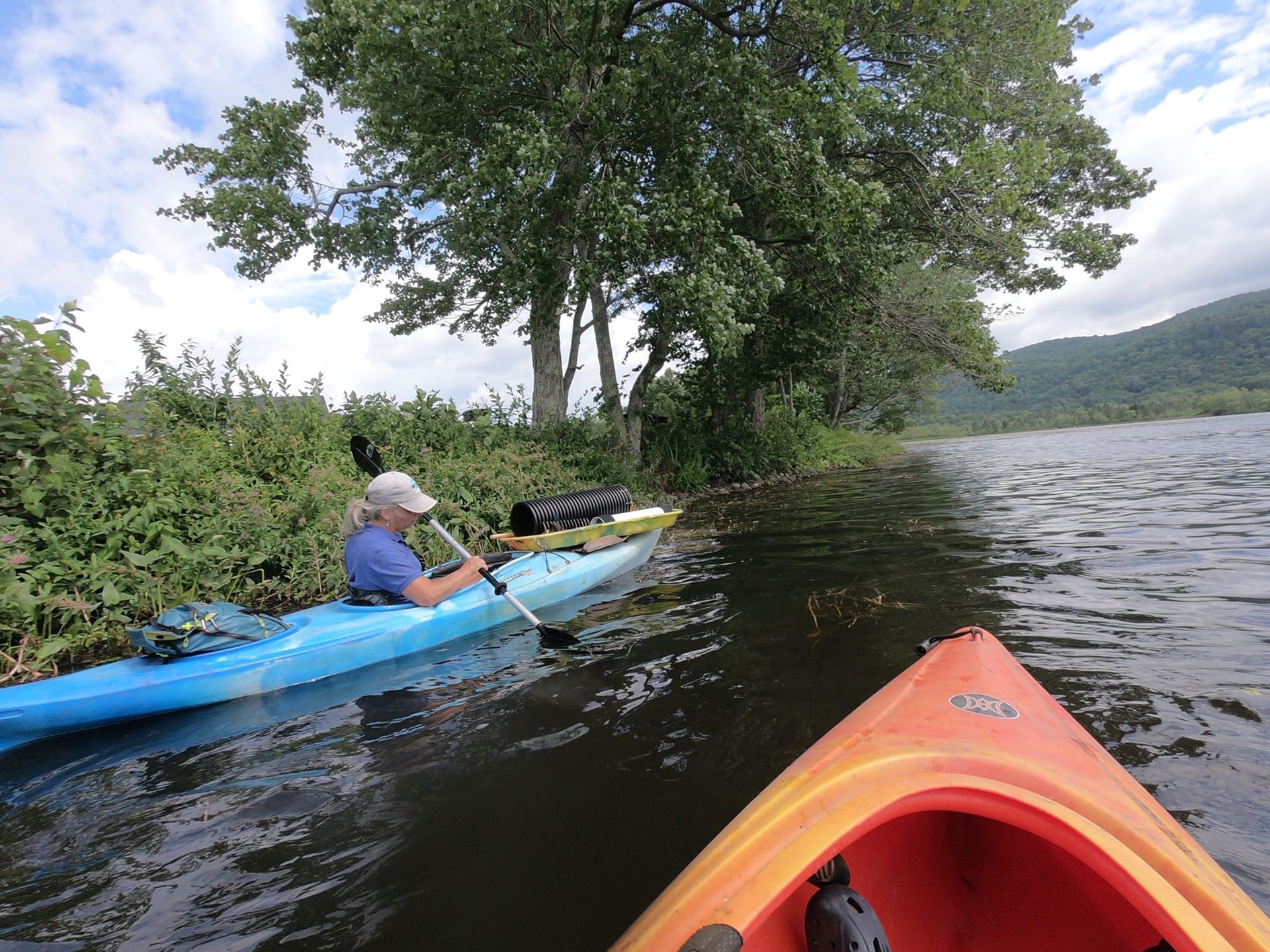
Loon Observation & Loon Safety Projects
We've been working with Eric Hanson from the Vermont Center for Ecostudies and Scott MacLachlan to come up with a form to log and record data about the loons visiting LSC. We are hoping that their increased visits to LSC will lead to a nesting pair!
The number of loons observed on LSC has been increasing over the past few years, as has the excitement and interest of the lake community. So, we've set up a form for you to be able to record your observations of loons on the lake! We ask that you please DO NOT approach the loons. If you see them, observe them from your location, take a photo if you'd like, and then visit the forms listed below to log your observations and notes.
There are 2 forms. One will allow you to upload photos or a short video of your loon observation, but it does require that you have a Google account. The other form does not require a Google account and will allow you to record your observation, but you will not be able to upload a photo or video.
On the form, you can add your name and email address (optional), the date, location, number of loons, a place to indicate if you see a subadult loon, and a description of their activity that you observe.
Here are the forms:
• Loon observation form (With Photo): https://bit.ly/lsc-log-loon-photo (Google Account required)
• Loon observation form (No Photo): https://bit.ly/lsc-log-loon-no-photo
We also hope to launch a new loon program in the spring with the Vermont Center for Ecostudies by participating in their lead & monofilament fishing line collection initiative. You can read more about this project in our Fall newsletter.
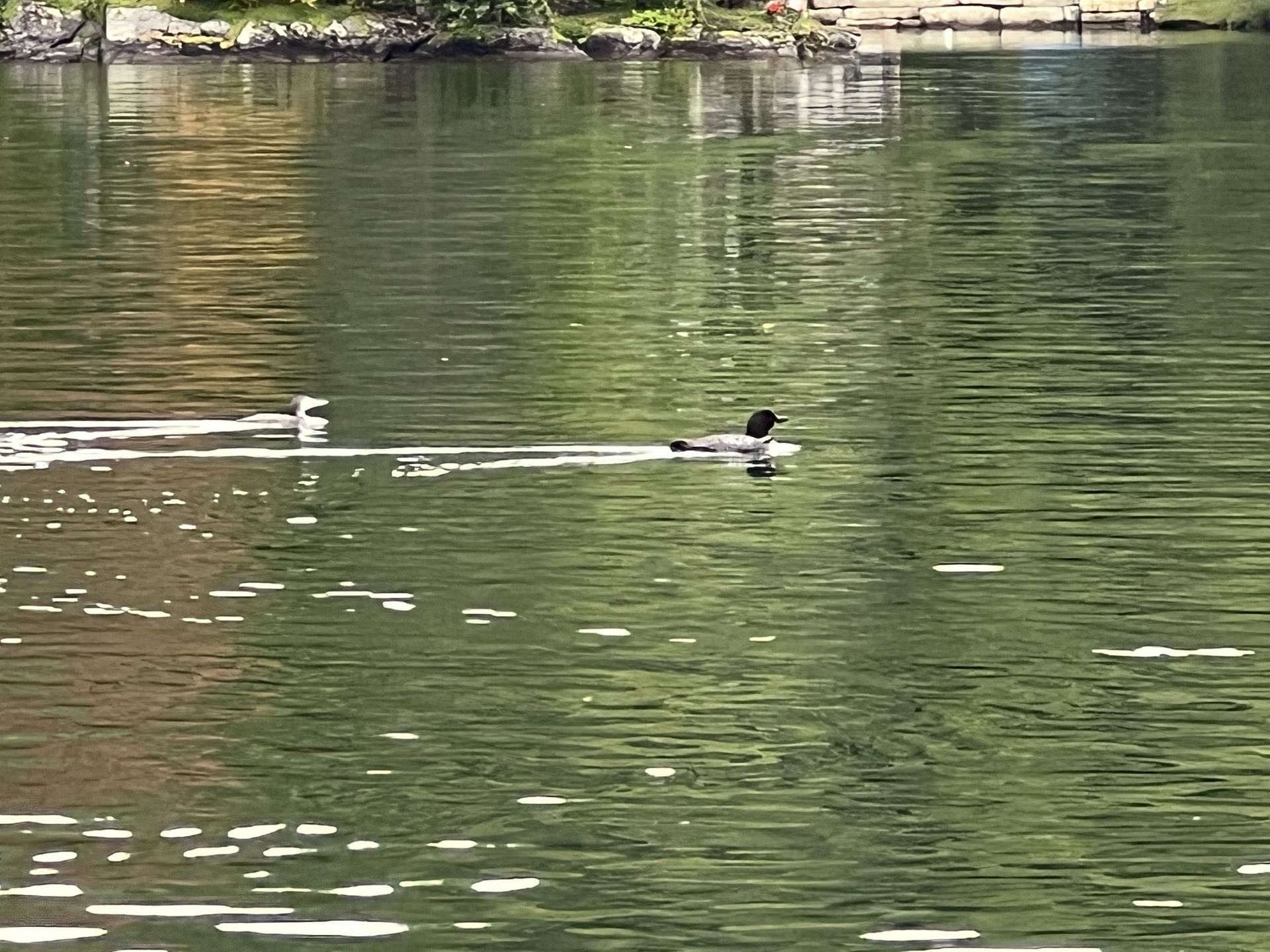
Grants
The LSCA has been working hard over the fall to bring grant funds to Lake St. Catherine for 2023. We have applied for a grant from the State of Vermont and from the LCBP for AIS control and prevention, and two other grants from the LCBP to help fund our Lake Wise Program, and an expanded Libraries Love Lakes program for 2023. Keep your fingers crossed.
Just before we were about to send out our Year In Review, we learned that we have received a grant from the LCBP to help fund our 2023 Lake Wise On LSC Program! Please contact us to get on the list for 2023!
Thank You For Your Support!
Finally, thank you to everyone who supported us this year. We hope you found our efforts in 2022 for Lake St. Catherine to be worthy.
2023 is going to be another busy year, and we hope to earn your support again in 2023. Be on the lookout for our Membership Drive which will begin in early February.
Happy Holidays, and we’ll see you at the lake soon,
- The Trustees of The Lake St. Catherine Association